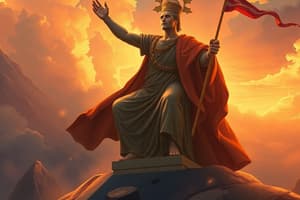Podcast
Questions and Answers
What is Classical Liberalism?
What is Classical Liberalism?
The belief that the unrestricted action of the individual is the mainspring of all progress; to rely on the individual.
What led to the development of Classical Liberalism? (Select all that apply)
What led to the development of Classical Liberalism? (Select all that apply)
- Protestant theology emphasizing individual responsibility (correct)
- Advancements in technology
- Agriculture/guild system breakdown (correct)
- The age of reason (correct)
Who wrote 'Second Treatise of Civil Government'?
Who wrote 'Second Treatise of Civil Government'?
John Locke
What did Montesquieu call for in 'The Spirit of the Laws'?
What did Montesquieu call for in 'The Spirit of the Laws'?
Who is known as the economist that advocated for the market economy?
Who is known as the economist that advocated for the market economy?
What is the 'Invisible Hand' according to Adam Smith?
What is the 'Invisible Hand' according to Adam Smith?
What is free trade?
What is free trade?
What does it mean that the economy is driven by self-interest?
What does it mean that the economy is driven by self-interest?
Who founded utilitarianism?
Who founded utilitarianism?
What is a key principle of utilitarianism?
What is a key principle of utilitarianism?
What does 'the greatest good to the greatest number' mean?
What does 'the greatest good to the greatest number' mean?
What is laissez-faire?
What is laissez-faire?
What did Thomas Malthus write about?
What did Thomas Malthus write about?
What did David Ricardo argue for?
What did David Ricardo argue for?
What is the Law of Accumulation?
What is the Law of Accumulation?
Who wrote 'On Liberty'?
Who wrote 'On Liberty'?
What is the main argument in 'On Liberty'?
What is the main argument in 'On Liberty'?
Flashcards are hidden until you start studying
Study Notes
Classical Liberalism Overview
- Classical Liberalism emphasizes individual freedom as the driver of societal progress, advocating minimal government intervention in personal and economic matters.
- It promotes the idea that allowing individuals to act freely leads to societal advancement.
Historical Influences on Classical Liberalism
- Rooted in Protestant theology, stressing individual responsibility for salvation.
- Shift from agriculture and guild systems created economic independence.
- The Age of Reason fostered belief in human rationality, leading to optimism about human nature and governance.
Key Thinkers and Their Contributions
-
John Locke
- Authored "Second Treatise of Civil Government."
- Introduced the concept of government based on consent, individual rights protection, and separation of powers.
-
Montesquieu
- Wrote "The Spirit of the Laws."
- Advocated for constitutional government through the Separation of Powers to prevent concentration of power.
-
Adam Smith
- Considered the father of modern economics.
- Promoted market economy principles, arguing for individual freedoms and competition without government interference.
- Coined the term "invisible hand" in "The Wealth of Nations," advocating for market self-regulation.
Economic Principles
-
Free Trade
- Smith's approach to unimpeded trade avoids restrictions and promotes efficiency.
-
Self-Interest in Economic Transactions
- Economic activity is driven by self-interest, which leads to better resource allocation than government planning.
Philosophical Foundations
-
Jeremy Bentham
- Established utilitarianism, focusing on maximizing happiness and the overall welfare of society.
- Encouraged critical questioning of traditional ideas and policies based on their utility.
-
Utilitarianism
- Focuses on policies that enhance societal progress and happiness.
-
Greatest Good Principle
- Advocates for actions that benefit the majority as the best approach to governance.
Economic Policies and Theories
-
Laissez-faire Economics
- A doctrine promoting minimal government intervention, enabling individuals to pursue self-interest freely.
-
Thomas Malthus
- Authored "Essay on the Principle of Population," warning that improvements in living standards could lead to population surges, ultimately negating those gains.
-
David Ricardo
- Advocated for international trade based on comparative advantage to achieve optimal outcomes.
The Law of Accumulation
- Describes how increased machinery investment leads to capital growth, promoting industrial productivity.
John Stuart Mill
- A well-educated philosopher who synthesized ideas from Bentham and Smith.
- Wrote "On Liberty," defending individual freedoms and the importance of diverse ideas in society.
"On Liberty" Highlights
- Advocates for maximum personal freedom, stating that only harm to others justifies interference in individual liberties.
- Emphasizes that society benefits when all ideas can be freely expressed and debated, underscoring the importance of tolerating unpopular opinions.
Studying That Suits You
Use AI to generate personalized quizzes and flashcards to suit your learning preferences.




